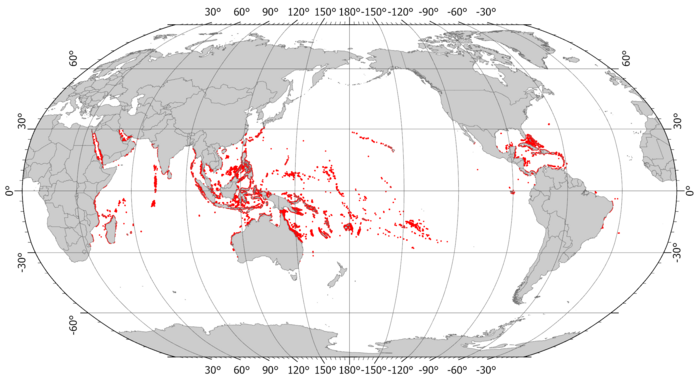Reviewed by Mila PereraSep 12 2022
In the Indo-Pacific, coral reef islands and their reefs naturally expand and contract due to intricate biological and physical processes that are still not fully understood. They are currently being further disrupted by climate change, creating additional uncertainty for small island states and legal maritime zones.
 Global coral reef distribution (red dots). Image Credit: Millennium Coral Reef Mapping Project/World Atlas of Coral Reefs.
Global coral reef distribution (red dots). Image Credit: Millennium Coral Reef Mapping Project/World Atlas of Coral Reefs.
Fortunately, expanded research into the behavior of coral reef islands, in addition to new technology and methods, may clarify some doubts and support assertions.
Scientists from the University of Sydney have found that as sea levels rise and ocean acidification compromises the integrity of coral reefs, the international law of the sea’s regulations for atolls and coral reefs — which are already ambiguous and open to interpretation due to their shifting nature — will be put under even more strain.
It’s a perfect storm that is bringing instability and uncertainty to what are already difficult boundaries to determine with any great accuracy.
Dr. Thomas Fellowes, Study Lead Author and Postdoctoral Research Associate, School of Geosciences, University of Sydney
Dr. Thomas Fellowes adds, “There are geopolitical consequences too. Coral reef islands are the legal basis for many large maritime zones. Hence, the climate disruptions we’re already seeing—and will see in the decades ahead—may have substantial impact not only for small island states, but in hotly contested boundary disputes in places like the South China Sea.”
This treaty, accepted almost universally and signed by 167 countries, regulates everything from territorial waters, up to 12 nautical miles from a shore or a reef’s low-water line, to exclusive economic zones, extending up to 200 nautical miles. It codifies the regulations governing freedom of navigation and enables countries to utilize, protect, and manage resources in nearby waters.
For coral islands, the outer ‘low-water line’ of the reef is used as the legal baseline to establish maritime zones. The potential loss of maritime zones due to changes in reef baselines from climate change is a serious concern for nations like Kiribati, as well as for larger ones like Australia, who depend on reefs and islands to maintain their claims.
Frances Anggadi, PhD Student, University of Sydney Law School
Frances Anggadi states, “But there is still no clear agreement whether changes to the structural integrity of coral reef islands due to climate will lead to legal vulnerabilities. They may not, and that’s what many Pacific island countries believe. What’s clear is that a more detailed understanding of coral reef island behavior is needed, along with rethinking of the legal rules”.
Coral reefs are vulnerable, only thriving within a specific range of biophysical, ocean and climate conditions. But changes in sedimentation due to climate change may support coral islands and strengthen some maritime claims. It’s not entirely clear that there will only be losers.
Dr. Thomas Fellowes, Study Lead Author and Postdoctoral Research Associate, School of Geosciences, University of Sydney
The scholars claim that defining reef baselines using geographic coordinates, such as GPS, or remote sensing techniques, such as satellite bathymetry, is one way to support existing claims.
Another is to better understand how climate change would impact an island’s ability to support human habitation or economic life, as doing so is another approach to prove that a claim is legitimate under the treaty's terms.
However, for these strategies to be effective, more data on each coral reef island system is required to more precisely define the true scope of the claims already made, assess how resilient those claims have been so far, and comprehend how aspects of climate change may affect them in the future.
The four ways climate change affects coral reef systems and maritime boundaries are rising sea levels, warming oceans, ocean acidification, and increased storminess.
Each affects the intricately linked biophysical processes that allow coral reefs and islands to form, retreat, and maintain their overall structural integrity.
For instance, warmer temperatures cause algae symbionts in corals and other invertebrates (such as giant clams) to expel their hosts, causing coral bleaching, which, if enough coral organisms perish, can cause a reef to collapse. In the following decades, this might cause the reef’s outer low-water line to recede, weakening the foundation for a maritime claim.
The coral formation is hampered by ocean acidification due to the oceans absorbing increasing amounts of carbon dioxide. Acropora, a small polyp abundant in tropical reefs, and other reef-building species start to alter their skeletal structures so that they depend less on carbonate minerals, endangering the stability of the entire reef.
The reefs become fringing, barrier, or atoll reefs as they develop and spread out. The most frequent types of reefs are those that extend seaward from the beach and create borders along shorelines and adjacent islands. Barrier reefs accomplish this at a longer distance, a lagoon of frequently deep water separating them from the land. An atoll develops when a volcanic island submerges below the surface and the reef coral on it keeps expanding.
Journal Reference:
Fellowes, T. E., et al. (2022) Stability of coral reef islands and associated legal maritime zones in a changing ocean. Environmental Research Letters. doi.org/10.1088/1748-9326/ac8a60.